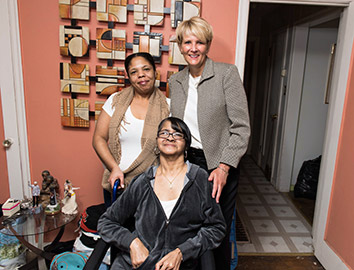Subscriber Benefit
As a subscriber you can listen to articles at work, in the car, or while you work out. Subscribe Now
 FINALIST: Community Achievement in Health Care
FINALIST: Community Achievement in Health Care
Structured Family Caregiving/Caregiver Homes
For elderly or disabled people who can’t manage their own care, a common fear is being forced into a nursing home or some other facility. If only a family member or friend could provide the needed care, that fear would be erased.
In Indiana, a program exists that helps people stay home by paying care givers and giving them assistance in carrying out what can be a daunting task.
The program, known as Structured Family Caregiving, was made possible beginning in July 2013 by the federal government’s Centers for Medicare and Medicaid Services, which agreed to fund the program in Indiana through the state’s Aged and Disabled Waiver.
 Caregiver Homes’ Kelli Tungate joins Beverly Quarles (seated) and her daughter Nicole Quarles. (IBJ Photo/ Eric Learned)
Caregiver Homes’ Kelli Tungate joins Beverly Quarles (seated) and her daughter Nicole Quarles. (IBJ Photo/ Eric Learned)Indiana was the fifth state to get Medicaid to fund the program and is now one of seven that offer the service, which is provided by Caregiver Homes, a Boston-based company that has placed 200 people across the state in the program since November 2013. Caregiver Homes estimates that keeping those people home has saved the state almost $5 million in Medicaid funds that would have otherwise been spent to house aged or disabled people in nursing homes.
The biggest benefit can’t be measured in dollars saved, said Kelli Tungate, state operations director in Indiana for Caregiver Homes. It’s the peace of mind provided to those who participate in the program—those in need of care and their care givers.
Nicole Quarles, 38, cares for her 65-year-old mother, Beverly, full time since starting the program at the beginning of the year.
Nicole said the program has eliminated some of the stress she felt when she was away from home and her mother was in the care of others.
As for her mother, Nicole said, “She tells everybody, ‘I don’t have to tell [Nicole] what to do because she already knows what to do.’”
To participate, one must be referred to the program by one of the state’s 16 not-for-profit Area Agencies on Aging, which in Marion County is CICOA Aging & In-Home Solutions. Candidates must be Medicaid-eligible and deficient in at least three of the five so-called activities of daily living, such as bathing, feeding oneself and mobility. Recipients of the service must live with their care giver on a full-time basis.
Care givers receive a stipend, typically $900 to $1,200 a month, depending on the level of care required.
But the financial reward isn’t the whole story. Care givers also receive structured support from the staff of Caregiver Homes, which assigns a team of one registered nurse and one care manager to every case. After several initial visits to develop a plan of care and to assess the capabilities of the care giver, the team visits each home twice a month. They provide coaching, education and support between visits based on electronic notes provided daily by the care giver.
Tungate spent 18 years working for CICOA because of its mission to help the elderly stay in their homes as long as possible, but the potential of Structured Family Caregiving lured her away.
“I never imagined leaving CICOA, but I believe in this model of supporting the care giver,” she said.•
Please enable JavaScript to view this content.

